Monthly Archives: June 2017
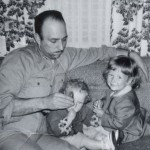 I read somewhere that the Sunday before Father’s Day is Write a Letter to your Father Day, and I found myself wishing this was a day I had known about a long time ago, because while Father’s Day is traditionally a day on which we show our dads that we love and appreciate them, Write a Letter to your Father Day, in my opinion really had a far deeper meaning in so many ways. Looking back on my life, there are so many things I would love to thank my dad for, and indeed, my parents for, but since this is about dads, I’ll take this one step at a time. Since my dad, Allen Spencer is in Heaven now, my letter will not be able to be sent or received, so I’m sure my dad won’t mind if this is all done in cyberspace.
I read somewhere that the Sunday before Father’s Day is Write a Letter to your Father Day, and I found myself wishing this was a day I had known about a long time ago, because while Father’s Day is traditionally a day on which we show our dads that we love and appreciate them, Write a Letter to your Father Day, in my opinion really had a far deeper meaning in so many ways. Looking back on my life, there are so many things I would love to thank my dad for, and indeed, my parents for, but since this is about dads, I’ll take this one step at a time. Since my dad, Allen Spencer is in Heaven now, my letter will not be able to be sent or received, so I’m sure my dad won’t mind if this is all done in cyberspace.
Dear Dad, Words can never really express how deeply blessed I feel to have been born your daughter. I came home to a house filled with love, and parents who raised me and my sisters in God’s ways. We learned the basics, of course, have faith in God, share with others, helpout around the house, have respect for our parents and those in authority, and to always be honorable in all things. We always knew that no matter what, we were a family, and family came first. We learned that there was nothing we could ever do to lose your love for us, and that no matter how badly we messed up, we could always come to our parents for help and guidance. The one thing we never received from you was judgment and condemnation, because those things are totally out of  character with love, and you totally loved your family.
character with love, and you totally loved your family.
Over the years, you showed us this great country we live in and taught us to love camping and all kinds of travel. You kept the fires going to scare away the bears, because we thought it would work, and you never made us feel silly for suggesting such a crazy thing. As we grew to our teen years, you understood that getting five girls ready in the morning was not a simple matter, but rather a two hour ordeal, while you patiently waited drinking a cup of coffee. There was so much you wanted to show us, but we were girls, and while we wanted to see most of it, vacation simply did not mean that we went out in public, sans makeup. Dad, you were so outnumbered, all of your married life, but you always seemed to take it in stride.
You and Mom taught us how a marriage and family should look, and how parents should raise their kids. Our families have been enriched by the family life we lived as kids. You always wanted your family around you, and Dad you made sure that if we got busy in our lives, we didn’t forget to come and have lunch with you and Mom. It kept us connected. You loved to hear about our lives, our work, our kids, our husbands. You wanted to 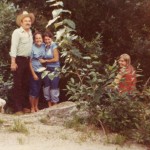 be a part of our lives, but you were never intrusive…just interested. I always loved that about you and Mom, and those lunches will always have a very special place in my memory files. They were among the sweetest memories.
be a part of our lives, but you were never intrusive…just interested. I always loved that about you and Mom, and those lunches will always have a very special place in my memory files. They were among the sweetest memories.
Dad, I could go on and on about how wonderful you and Mom made our lives, but I guess that will be a letter for another day. I just want to thank you for making life for my sisters and me, the most wonderful kind of life in the world. We have been so wonderfully blessed by God when he made you and Mom our parents. Today isn’t a traditional special day, but really just a day to let you know that I am thinking of you always. I love you so much, Dad. Your daughter, Caryn.
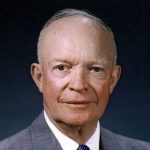 In any wartime situation, there always seem to be those who think the United States should not get involved…mostly because they think that if we just stay out of it, the enemy will leave us alone. Of course, history does not prove that theory. When we look at the wars that the United States has been drawn into, only after we were attacked too, we find that the enemy always intended to take on the United States too, and we were only delaying the inevitable. It seems like every wartime president has had to deal with the naysayers, and President Eisenhower was no different. During the Cold War years when the Communists were trying to take over the world, Eisenhower chose a strong United States defense against it, but his view of a strong defense was much different that General Hoyt Vandenberg’s view. Vandenberg wanted a massive increase in conventional land, air, and sea forces, while Eisenhower said that a cheaper and more efficient defense could be built around the nation’s nuclear arsenal. Senator Robert Taft argued that if efforts to reach a peace agreement in Korea failed, the United States should withdraw from the United Nations forces and make its own policy for dealing with North Korea, basically a completely independent foreign policy, or what one “might call the ‘fortress’ theory of defense.” While both of these suggestions might seem like the best course of action, history tells us that Senator Taft’s suggestion would make us look weak, and possibility bring about attacks on the United States, and while I would tend to agree with General Vandenberg, that we need a strong defense system, I also understand that as technology changes, nations must change with it. Having hundreds of fighter planes is not necessary, if a few can drop a bomb that will settle the matter once and for all. It is similar to the use of pen and paper when we live in a computer age.
In any wartime situation, there always seem to be those who think the United States should not get involved…mostly because they think that if we just stay out of it, the enemy will leave us alone. Of course, history does not prove that theory. When we look at the wars that the United States has been drawn into, only after we were attacked too, we find that the enemy always intended to take on the United States too, and we were only delaying the inevitable. It seems like every wartime president has had to deal with the naysayers, and President Eisenhower was no different. During the Cold War years when the Communists were trying to take over the world, Eisenhower chose a strong United States defense against it, but his view of a strong defense was much different that General Hoyt Vandenberg’s view. Vandenberg wanted a massive increase in conventional land, air, and sea forces, while Eisenhower said that a cheaper and more efficient defense could be built around the nation’s nuclear arsenal. Senator Robert Taft argued that if efforts to reach a peace agreement in Korea failed, the United States should withdraw from the United Nations forces and make its own policy for dealing with North Korea, basically a completely independent foreign policy, or what one “might call the ‘fortress’ theory of defense.” While both of these suggestions might seem like the best course of action, history tells us that Senator Taft’s suggestion would make us look weak, and possibility bring about attacks on the United States, and while I would tend to agree with General Vandenberg, that we need a strong defense system, I also understand that as technology changes, nations must change with it. Having hundreds of fighter planes is not necessary, if a few can drop a bomb that will settle the matter once and for all. It is similar to the use of pen and paper when we live in a computer age.
President Eisenhower was no stranger to sending the military might of the United States out to attack the enemy, and in his days as a general, he made those decisions every day, but as every one should realize, the 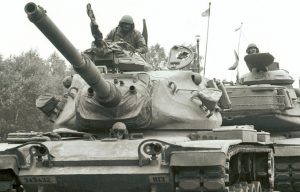 more men you have to send, the more possibility of losing them. The decision to send soldiers to their deaths was not one that Eisenhower ever took lightly. With a strong nuclear arsenal, the enemy nation knew that they had better think twice before taking on the United States.
more men you have to send, the more possibility of losing them. The decision to send soldiers to their deaths was not one that Eisenhower ever took lightly. With a strong nuclear arsenal, the enemy nation knew that they had better think twice before taking on the United States.
Without naming either man, President Eisenhower responded to both during a speech at the National Junior Chamber of Commerce meeting in Minneapolis. His forceful speech struck back at critics of his Cold War foreign policy. He insisted that the United States was committed to the worldwide battle against communism and that he would maintain a strong United States defense. It was just a few months into his presidency, and the Korean War still raging, but Eisenhower laid out his basic approach to foreign policy with this speech. He began by characterizing the Cold War as a battle “for the soul of man himself.” He rejected Taft’s idea that the United States should pursue isolationism, and instead he insisted that all free nations had to stand together saying, “There is no such thing as partial unity.” To Vandenberg’s criticisms of the new Air Force budget, in which the president proposed a $5 billion cut from the Air Force budget, Eisenhower explained that vast numbers of aircraft were not needed in the new atomic age. Just a few planes armed with nuclear weapons could “visit on an enemy as much explosive violence as was hurled against Germany by our entire air effort throughout four years of World War II.” With this speech, Eisenhower thus pointed out the two major points of what came to be known at the time as his “New Look” foreign policy. First was his advocacy of multi-nation responses to communist aggression in preference to unilateral action by the United States. Second was the idea that came to be known as the “bigger bang for the buck” defense strategy.
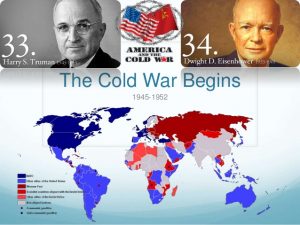 Anytime a nation is facing war, it is a stressful time for its people, but no nation will do well using the isolation strategy, because a nation that appears to be weak in its own defense, will ultimately become a target for attack. I am not an advocate for the United Nations, and in fact, I believe we need to disband the United Nations, but I do believe that a nation must have allies…nations with like values, who are willing to go to war to back up their allies, and that we must not allow bully nations to take over smaller nations, because that only strengthens their resolve to expand further. I also believe that when technology becomes available, it must be properly combined with human forces to achieve the best result in the most efficient way.
Anytime a nation is facing war, it is a stressful time for its people, but no nation will do well using the isolation strategy, because a nation that appears to be weak in its own defense, will ultimately become a target for attack. I am not an advocate for the United Nations, and in fact, I believe we need to disband the United Nations, but I do believe that a nation must have allies…nations with like values, who are willing to go to war to back up their allies, and that we must not allow bully nations to take over smaller nations, because that only strengthens their resolve to expand further. I also believe that when technology becomes available, it must be properly combined with human forces to achieve the best result in the most efficient way.
 For most graduated college students, the next step is to look for a job in your field, and my niece, Kayla Stevens is no different. Since her graduation Kayla has sent résumés to several places in Casper, and in Sheridan, where she is from. It didn’t take very long for a therapy clinic in Sheridan to grab her up. When you have the grades she did, you become the pick of the litter of graduates. Things are happening pretty fast now. Kayla starts her new job in just ten days, and so she is working on finding a house for them to live in. I am not sure when her husband, Garrett, my nephew will be joining Kayla in Sheridan, but since she starts her job on June 19th, she will be in Sheridan before we have hardly had a chance to blink. I know how hard this will be for my sister, Alena Stevens, and her husband Mike, but of
For most graduated college students, the next step is to look for a job in your field, and my niece, Kayla Stevens is no different. Since her graduation Kayla has sent résumés to several places in Casper, and in Sheridan, where she is from. It didn’t take very long for a therapy clinic in Sheridan to grab her up. When you have the grades she did, you become the pick of the litter of graduates. Things are happening pretty fast now. Kayla starts her new job in just ten days, and so she is working on finding a house for them to live in. I am not sure when her husband, Garrett, my nephew will be joining Kayla in Sheridan, but since she starts her job on June 19th, she will be in Sheridan before we have hardly had a chance to blink. I know how hard this will be for my sister, Alena Stevens, and her husband Mike, but of  course, Kayla’s family has been missing her since she came to Casper for college. Kayla and Garrett decided that she would apply in both cities, and go where God led them, so I know that this move and this job will be a great blessing for both of them.
course, Kayla’s family has been missing her since she came to Casper for college. Kayla and Garrett decided that she would apply in both cities, and go where God led them, so I know that this move and this job will be a great blessing for both of them.
Kayla has such a caring heart, and the patients whose lives she will impact are among the most blessed people around. She loves working with children, so I hope that she will be able to have some kids in that group too, because they would be very blessed to have her helping them with whatever they need. I don’t know what Kayla’s job will entail, but I know that with her abilities, she will be very successful at it, and I look forward to hearing more about it as time goes by. Of course, with social work, as with  any medical profession, privacy is the word of the day, so mostly we will hear about the general day to day work, and not about specific patients.
any medical profession, privacy is the word of the day, so mostly we will hear about the general day to day work, and not about specific patients.
Sheridan is a beautiful town, and since Kayla and Garrett love to camp, they will really enjoy the easy access to the Big Horn Mountains, and all the other outdoor activities Sheridan has to offer. The future will be a very exciting one for them as they settle in to their new jobs, and I’m sure someday soon, start a family. I know that my sister, Alena and her family will also have a lot of visits to Sheridan in their future. Kayla and Garrett will come to visit too, but we will all miss them very much anyway. Today is Kayla’s birthday. Happy birthday Kayla!! Have a great day!! We love you!!
 For most of us, taking a fall, of any kind is no fun. Taking a fall off of a one story roof is terrifying, and if we were to fall from a two story building, we might not expect to live through it. For Serbian flight attendant, Vesna Vulovic a two story fall is like stubbing her toe. On January 26, 1972, while she was working on JAT Flight 367, a terrorist bomb exploded on the plane. Vesna found herself in a freefall without a parachute at an altitude of 33,333 feet. Vulovic, who was just 22 years old, and thought she had landed a wonderful career that would allow her to travel to exotic places. Never in a million years did she imagine that her career would end this way.
For most of us, taking a fall, of any kind is no fun. Taking a fall off of a one story roof is terrifying, and if we were to fall from a two story building, we might not expect to live through it. For Serbian flight attendant, Vesna Vulovic a two story fall is like stubbing her toe. On January 26, 1972, while she was working on JAT Flight 367, a terrorist bomb exploded on the plane. Vesna found herself in a freefall without a parachute at an altitude of 33,333 feet. Vulovic, who was just 22 years old, and thought she had landed a wonderful career that would allow her to travel to exotic places. Never in a million years did she imagine that her career would end this way.
Flight 367 was flying over Srbská Kamenice in Czechoslovakia, which is now part of the Czech Republic. She had not been scheduled to be on that flight, but she had been mixed up with another flight attendant who was also named Vesna. I’m sure she wished she had not been as she was falling through the air that awful day in 1972. While falling 33,333 feet, a person has a good bit of time to think about what they wished they had done, or not done. And at 22, I’m sure there were many things she had hoped to accomplish in her lifetime, and now those things could never happen.
The official report of the Czechoslovak investigation commission, which was handed over to the ICAO on May 7, 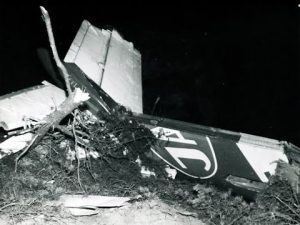 1974, stated that there had been an explosion in the front baggage compartment of the plane. The Czechoslovak secret service, which was leading the investigation, presented parts of an alarm clock ten days after the crash which they claimed came from a bomb. The report concluded that a bomb brought down Flight 367. That morning, an anonymous man called the newspaper Kvällsposten published in Malmö, Sweden, claiming, in broken Swedish, that he was a Croat and member of a nationalist group that placed the bomb on the plane. Shortly after the phone call, the Yugoslav government blamed the Ustaše. According to the official report the explosion tore the McDonnell Douglas DC-9-32 to pieces in mid-air. Vulovic was the only survivor.
1974, stated that there had been an explosion in the front baggage compartment of the plane. The Czechoslovak secret service, which was leading the investigation, presented parts of an alarm clock ten days after the crash which they claimed came from a bomb. The report concluded that a bomb brought down Flight 367. That morning, an anonymous man called the newspaper Kvällsposten published in Malmö, Sweden, claiming, in broken Swedish, that he was a Croat and member of a nationalist group that placed the bomb on the plane. Shortly after the phone call, the Yugoslav government blamed the Ustaše. According to the official report the explosion tore the McDonnell Douglas DC-9-32 to pieces in mid-air. Vulovic was the only survivor.
Vulovic suffered a fractured skull, three broken vertebrae, one of which was crushed completely, and that left her temporarily paralyzed from the waist down, and two broken legs. She was in a coma for 27 days. In an interview, she commented that according to the man who found her, “…I was in the middle part of the plane. I was found with my head down and my colleague on top of me. One part of my body with my leg was in the plane and my head was out of the plane. A catering trolley was pinned against my spine and kept me in the  plane. The man who found her said she was lucky. He was in the German Army as a medic during World War II. He knew how to treat trauma. The medic is identified as Bruno Henke. Vulovic continued working for JAT Airways at a desk job following a full recovery from her injuries. She regained the use of her legs and continued to fly sporadically. She claimed she had no fear of flying, which she attributed to her loss of memory of the crash, and she even enjoyed watching movies with plane crashes. She was considered a national heroine throughout the former Yugoslavia and was awarded the Guinness Record title by Paul McCartney at a ceremony in 1985. As to becoming the world record freefall holder, Vesna comments, “I am like a cat, I have had nine lives.”
plane. The man who found her said she was lucky. He was in the German Army as a medic during World War II. He knew how to treat trauma. The medic is identified as Bruno Henke. Vulovic continued working for JAT Airways at a desk job following a full recovery from her injuries. She regained the use of her legs and continued to fly sporadically. She claimed she had no fear of flying, which she attributed to her loss of memory of the crash, and she even enjoyed watching movies with plane crashes. She was considered a national heroine throughout the former Yugoslavia and was awarded the Guinness Record title by Paul McCartney at a ceremony in 1985. As to becoming the world record freefall holder, Vesna comments, “I am like a cat, I have had nine lives.”
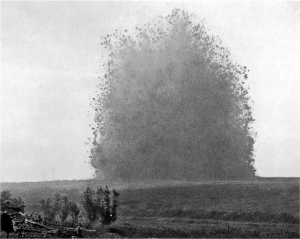 The manner in which battles are fought and won, never ceases to amaze me. In 1916, British forces began planning the Battle of Messines Ridge. For 18 months, soldiers worked to place nearly 1 million pounds of explosives in tunnels under the German positions. The tunnels extended to some 2,000 feet in length, and some were as much as 100 feet below the surface of the ridge, where the Germans had long since been entrenched. The Germans had no idea that they were there, and no idea what was going to happen. I find myself in complete amazement, that all those soldiers were working a mere 100 feet below ground, and the German soldiers above them had no idea. It was the element of surprise that was the whole key to this successful attack.
The manner in which battles are fought and won, never ceases to amaze me. In 1916, British forces began planning the Battle of Messines Ridge. For 18 months, soldiers worked to place nearly 1 million pounds of explosives in tunnels under the German positions. The tunnels extended to some 2,000 feet in length, and some were as much as 100 feet below the surface of the ridge, where the Germans had long since been entrenched. The Germans had no idea that they were there, and no idea what was going to happen. I find myself in complete amazement, that all those soldiers were working a mere 100 feet below ground, and the German soldiers above them had no idea. It was the element of surprise that was the whole key to this successful attack.
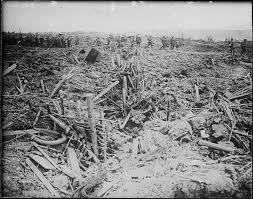 At 3:10am on June 7, 1917, a series of simultaneous explosions rocked the area. The explosions were heard as far away as London. A German observer described the explosions saying, “nineteen gigantic roses with carmine petals, or enormous mushrooms, rose up slowly and majestically out of the ground and then split into pieces with a mighty roar, sending up multi-colored columns of flame mixed with a mass of earth and splinters high in the sky.” While Messines Ridge itself was considered a relatively limited victory, it had a considerable effect. German losses that day included more than 10,000 men who died instantly, along with some 7,000 prisoners…men who were too stunned and disoriented by the explosions to resist the infantry assault.
At 3:10am on June 7, 1917, a series of simultaneous explosions rocked the area. The explosions were heard as far away as London. A German observer described the explosions saying, “nineteen gigantic roses with carmine petals, or enormous mushrooms, rose up slowly and majestically out of the ground and then split into pieces with a mighty roar, sending up multi-colored columns of flame mixed with a mass of earth and splinters high in the sky.” While Messines Ridge itself was considered a relatively limited victory, it had a considerable effect. German losses that day included more than 10,000 men who died instantly, along with some 7,000 prisoners…men who were too stunned and disoriented by the explosions to resist the infantry assault.
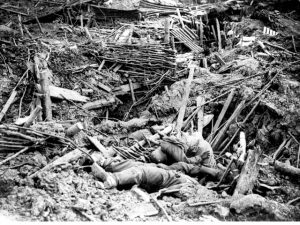
It was a crushing victory over the Germans. The German army was forced to retreat to the east. This retreat and the sacrifice that it entailed marked the beginning of their gradual, but continuous loss of territory along the Western Front. It also secured the right flank of the British army’s push towards the much-contested Ypres region, which was the eventual objective of the planned attack. Over the next month and a half, British forces continued to push the Germans back toward the high ridge at Passchendaele. Then on July 31 the British army launched it’s offensive, known as the Battle of Passchendaele or the Third Battle of Ypres.

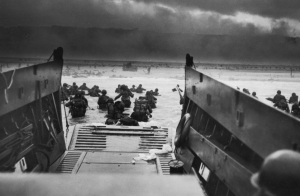 On this D-Day, a subject I have previously written about, I began to wonder about a different side of the story of this age old battle that everyone has heard of, even if some don’t know what it was all about. My thoughts turned to General Eisenhower. It was he who had the unfortunate task of deciding to attack the Germans who were occupying France, by way of the beaches of Normandy, France. It was he who had to carry the emotional burden of knowing that if the attack was made, he would be sending men to die. I would not have wanted to be in his shoes as he pondered this monumental decision. Nevertheless, someone had to make the decision. Things could not go on as they were. The future of the free world was dependent on the decisions made by this one man.
On this D-Day, a subject I have previously written about, I began to wonder about a different side of the story of this age old battle that everyone has heard of, even if some don’t know what it was all about. My thoughts turned to General Eisenhower. It was he who had the unfortunate task of deciding to attack the Germans who were occupying France, by way of the beaches of Normandy, France. It was he who had to carry the emotional burden of knowing that if the attack was made, he would be sending men to die. I would not have wanted to be in his shoes as he pondered this monumental decision. Nevertheless, someone had to make the decision. Things could not go on as they were. The future of the free world was dependent on the decisions made by this one man.
As families listened to their radio stations on the morning of June 6, 1944, one Valerie Lauder, who was 18 at the time, had graduated from Stephens Junior College that May and was not due at Northwestern University and the Medill School of Journalism until September was among the listeners. Her father was listening too, until he had to go to work. She said that President Roosevelt came on the radio and offered a prayer. Then, she heard General Eisenhower’s recorded reading of the order of the day, the troops in LSTs and transports heard it over loudspeakers. At that point, Val decided that she would really like to meet General Eisenhower, and given her chosen profession as a journalist, she was able to eventually make that happen. In fact, she was not only able to meet General Eisenhower 2½ years later, but was also able to preside at his press conference with the student press club that she had created and the Chicago Daily News sponsored.
She related the scene, “On January 18, 1947, Wearing two battle ribbons on his waist-length “Eisenhower jacket,” the supreme commander of the Allied Expeditionary Forces in Europe stood to my left, facing 165 student editors and photographers from high school and college newspapers throughout the greater Chicago area gathered in the Drake Hotel. Dressed in their Sunday best, pencils poised, notebooks open, they were seated on straight-back chairs set out in rows of 10 on either side of a center aisle. Ike stood at the end of the center aisle, about three feet in front of me. I introduced him.” As Val introduced General Eisenhower, she asked him, “General Eisenhower, what was the greatest decision you had to make during the war?” Eisenhower contemplated her question for a moment, and then answered her in a somber and serious tone about the D-Day landings. “To ensure the success of the Allied landings in Normandy,” he explained, “it was imperative that we prevent the enemy from bringing up reinforcements. All roads and rail lines leading to the areas of fighting on and around the beaches had to be cut or blocked. If reinforcements were allowed to reach the areas of fighting there, in our first, precarious attempts to get a foothold on the continent, the whole operation could be jeopardized. The landings might fail. The success of the landings on the beaches,” Ike said, reaching the end of the first row, starting back, “might well turn on the success of the paratroopers behind the lines.”
Then, on May 30, just six days before the scheduled landings, which were to have been June 5, a trusted aide and personal friend came to him, deeply concerned about the airborne landing. Val later that learned it was British Air Chief Marshal Sir Trafford Leigh-Mallory, who had been assigned to the Allied forces, with the title of Air Commander in Chief, which made him the air commander of the Allied invasion. He was apologetic about how late it was, so close to the jump-off time. But, he’d gone over it, and over it, and over it, and felt it simply would not succeed. The casualties would be too great. He pleaded with Eisenhower. “Casualties to glider troops would be 90% before they ever reached the ground,” he said. “The killed and wounded among the paratroopers would be 75%.” Eisenhower knew that would mean an unbearably high percentage of the 18,000 men who would drop into the darkness over Nazi-occupied France would become casualties. This would also mean that the survivors would be too few in number to succeed in their crucial mission of seizing, and holding the causeways. “The man was absolutely sincere, absolutely convinced it wouldn’t work,” Eisenhower said. “As a highly respected, capable officer, I trusted his judgment. I told him I’d think it over.”
After agonizing over the possible losses, he was still undecided just four days before the planned date. Eisenhower slowing, turned to face the students, he said, “I let the order stand.” With the words, his face seemed to relax. I suppose you would have to decide that you were going to be ok with the decision, or else it 
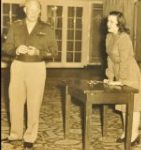 would drive you crazy. The students sat in stunned silence. “The airborne boys did their job.” Eisenhower went on with relief almost bordering on elation. “And, I am happy to say, the casualties were only 8%.” Eisenhower was not just a general setting up a battle, but rather a man with a heartfelt concern for the men in the airborne divisions and the men in the landing craft headed for the beaches. As he put it in his book, Crusade in Europe, “It would be difficult to conceive of a more soul-racking problem.” I have to agree. To only lose 8% of the men in that situation, well that is…unbelievable!!
would drive you crazy. The students sat in stunned silence. “The airborne boys did their job.” Eisenhower went on with relief almost bordering on elation. “And, I am happy to say, the casualties were only 8%.” Eisenhower was not just a general setting up a battle, but rather a man with a heartfelt concern for the men in the airborne divisions and the men in the landing craft headed for the beaches. As he put it in his book, Crusade in Europe, “It would be difficult to conceive of a more soul-racking problem.” I have to agree. To only lose 8% of the men in that situation, well that is…unbelievable!!
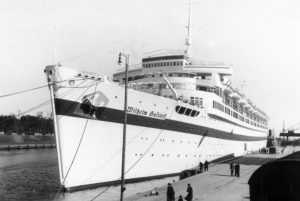 When we think of disasters at sea, Titanic is the first ship that most likely comes to mind, and while Titanic was a terrible tragedy, it was not the worst disaster at sea, by any means. It is amazing to me, however, that some of the others are never talked about at all, and in fact, you may have never heard about them. Titanic had a capacity of 3547 people, but was only carrying 2223 with passengers and crew. The loss of more than 1500 lives, was horrific to be sure, but it was not the worst disaster at sea in history. That distinction goes to The Wilhelm Gustloff.
When we think of disasters at sea, Titanic is the first ship that most likely comes to mind, and while Titanic was a terrible tragedy, it was not the worst disaster at sea, by any means. It is amazing to me, however, that some of the others are never talked about at all, and in fact, you may have never heard about them. Titanic had a capacity of 3547 people, but was only carrying 2223 with passengers and crew. The loss of more than 1500 lives, was horrific to be sure, but it was not the worst disaster at sea in history. That distinction goes to The Wilhelm Gustloff.
The Wilhelm Gustloff was built by the Blohm & Voss shipyards. It measured 684 feet 1 inch long by 77 feet 5 inches wide with a capacity of 25,484 gross register tons. The ship was launched on 5 May 1937. Originally the ship was intended to be named Adolf Hitler, but was named after Wilhelm Gustloff, a leader of the National Socialist Party’s Swiss branch, who had been assassinated by a Jewish medical student in 1936. Hitler decided on the name change after sitting next to Gustloff’s widow during his memorial service. I guess Hitler managed to do a few nice things in his horrid lifetime. The ship was the first purpose-built cruise liner for the German Labour Front or Deutsche Arbeitsfront, 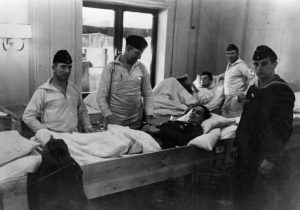 DAF and used by subsidiary organization Kraft durch Freude, KdF meaning Strength Through Joy. The purpose of the ship was to provide recreational and cultural activities for German functionaries and workers, including concerts, cruises, and other holiday trips, and as a public relations tool, to present “a more acceptable image of the Third Reich.” She was the flagship of the KdF cruise fleet, her last civilian role, until the spring of 1939.
DAF and used by subsidiary organization Kraft durch Freude, KdF meaning Strength Through Joy. The purpose of the ship was to provide recreational and cultural activities for German functionaries and workers, including concerts, cruises, and other holiday trips, and as a public relations tool, to present “a more acceptable image of the Third Reich.” She was the flagship of the KdF cruise fleet, her last civilian role, until the spring of 1939.
The Wilhelm Gustloff became a German hospital ship from September 1939 to November 1940, with its official designation being Lazarettschiff. Then, beginning on 20 November 1940, the medical equipment was removed from the ship and she was repainted from the hospital ship colors of white with a green stripe to standard naval grey. As a consequence of the British blockade of the German coastline, she was used as a barracks ship for approximately 1,000 U-boat trainees of the 2nd Submarine Training Division in the port of Gdynia, which had been occupied by Germany and renamed Gotenhafen. The ship was based near Danzig. Then, as things started to go from bad to worse during World War II, the Germans decided that they needed to evacuate as many people as possible from Courland, East Prussia and Danzig, West Prussia. On 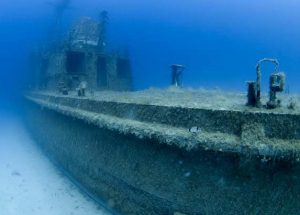 January 30, 1945 during Operation Hannibal, which was the naval evacuation of German troops and civilians from Courland, East Prussia, and Danzig, West Prussia as the Soviet Army advanced. The Wilhelm Gustloff’s final voyage was to evacuate German refugees and military personnel as well as technicians who worked at advanced weapon bases in the Baltic from Gdynia, then known to the Germans as Gotenhafen, to Kiel. The ship’s capacity was 1465, but because they were evacuating people, about 9,400 people were onboard. The ship was hit by a torpedo from Soviet submarine S-13 in the Baltic Sea. It quickly sank, taking all 9,400 people with it. The loss of the Wilhelm Gustloff remains the worst disaster at sea in history.
January 30, 1945 during Operation Hannibal, which was the naval evacuation of German troops and civilians from Courland, East Prussia, and Danzig, West Prussia as the Soviet Army advanced. The Wilhelm Gustloff’s final voyage was to evacuate German refugees and military personnel as well as technicians who worked at advanced weapon bases in the Baltic from Gdynia, then known to the Germans as Gotenhafen, to Kiel. The ship’s capacity was 1465, but because they were evacuating people, about 9,400 people were onboard. The ship was hit by a torpedo from Soviet submarine S-13 in the Baltic Sea. It quickly sank, taking all 9,400 people with it. The loss of the Wilhelm Gustloff remains the worst disaster at sea in history.
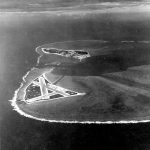 It’s a tiny island in the middle of the vast Pacific Ocean, so what possible impact could a battle for control of Midway Island have had? The answer is…much more than you might think. Sometimes, it’s not about the size of the nation, but rather about the might of its army. Japan is a little nation, it had built a mighty army and it was systematically defeating the Allies. Although other battles would soon make Midway seem like a small battle, no naval battle of World War II…and few others, if any, in all of naval history…would have so many momentous consequences ascribed to it as this one battle. So complete was Japan’s defeat at Midway, and so stunned was the Imperial High Command, that it would keep the results of the battle a secret from the Japanese people for the rest of the World War II.
It’s a tiny island in the middle of the vast Pacific Ocean, so what possible impact could a battle for control of Midway Island have had? The answer is…much more than you might think. Sometimes, it’s not about the size of the nation, but rather about the might of its army. Japan is a little nation, it had built a mighty army and it was systematically defeating the Allies. Although other battles would soon make Midway seem like a small battle, no naval battle of World War II…and few others, if any, in all of naval history…would have so many momentous consequences ascribed to it as this one battle. So complete was Japan’s defeat at Midway, and so stunned was the Imperial High Command, that it would keep the results of the battle a secret from the Japanese people for the rest of the World War II.
The story of the battle has been told many times over the years, and Midway continues to hold an almost mysterious place in the collective memory of the United States Navy and the United States in general. However, in recent decades a new generation of scholars has studied the facts of the battle. In some ways they 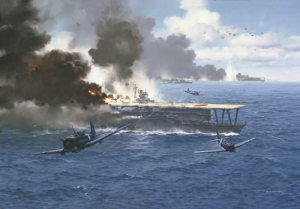 have removed the mystery of how such a “miracle” victory came to be and in other ways they have chalked it up to chance, luck, and the weather. The Americans had heard something about an attack, but the Japanese used the code location as “AF” to keep the attack location secret. The Americans suspected that it was Midway, so they sent a radio message that the island’s desalinization plant had broken down. The radio message was broadcast without encryption to ensure that Japan could read it if it was intercepted. The radio message was duly intercepted by Japan and reported by a message encoded in JN25 stating that AF’s desalinization plant was out of order and was intercepted by Station HYPO. “AF” was thus confirmed as Midway.
have removed the mystery of how such a “miracle” victory came to be and in other ways they have chalked it up to chance, luck, and the weather. The Americans had heard something about an attack, but the Japanese used the code location as “AF” to keep the attack location secret. The Americans suspected that it was Midway, so they sent a radio message that the island’s desalinization plant had broken down. The radio message was broadcast without encryption to ensure that Japan could read it if it was intercepted. The radio message was duly intercepted by Japan and reported by a message encoded in JN25 stating that AF’s desalinization plant was out of order and was intercepted by Station HYPO. “AF” was thus confirmed as Midway.
That was the beginning of the end for Japan. The Americans began to prepare for the attack. American scholars of Midway have long tried to explain away the many coincidences by characterizing the result of the battle as little short of a “miracle.” Walter Lord would name his 1967 narrative of Midway Incredible Victory, and 15 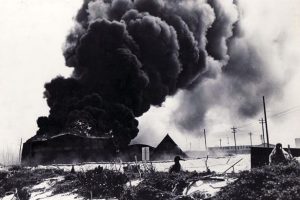 years later Gordon Prange’s posthumously published account of the battle was straightforwardly entitled Miracle at Midway. One battle participant’s memoir stated, “God was at Midway.” He saw divine intervention at work. The concept of the miracle has helped to explain the elements of the battle that have eluded detection, explication, or understanding. Some say that over the years, Midway has become less of a miracle, but that many mysteries remain. I say, that it was a miracle. God was at work at Midway. Even the weather worked against the Japanese when cloud cover prevented them from seeing what was right in front of them, and at the end of their attack…less than a week later, four Japanese fleet carriers would be twisted ruins on the bottom of the Pacific.
years later Gordon Prange’s posthumously published account of the battle was straightforwardly entitled Miracle at Midway. One battle participant’s memoir stated, “God was at Midway.” He saw divine intervention at work. The concept of the miracle has helped to explain the elements of the battle that have eluded detection, explication, or understanding. Some say that over the years, Midway has become less of a miracle, but that many mysteries remain. I say, that it was a miracle. God was at work at Midway. Even the weather worked against the Japanese when cloud cover prevented them from seeing what was right in front of them, and at the end of their attack…less than a week later, four Japanese fleet carriers would be twisted ruins on the bottom of the Pacific.
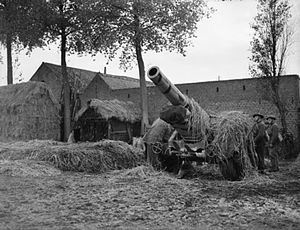 A declaration of war usually means that the people in both areas within the dispute had better prepare for eminent attack, because the declaration of war is like firing the warning shot before the actual open-fire begins. Of course, it may not be an immediate attack, but the attack always comes…or does it. On September 3, 1939, the United Kingdom and France declared war on Nazi Germany, after the Germans invaded Poland. Over the next eight months, at the start of World War II, there were no major military land operations on the Western Front. Strange, considering that the United Kingdom and France had declared war on Nazi Germany. You would think that they would attack or something, but nothing happened. During those eight months, Poland was overrun. It took about five weeks for the German Invasion of Poland beginning September 1, 1939 and the Soviet invasion beginning on 17 September 1939. Still, the Western Allies did nothing. I guess I don’t understand that. War had been declared by each side, but no Western power would
A declaration of war usually means that the people in both areas within the dispute had better prepare for eminent attack, because the declaration of war is like firing the warning shot before the actual open-fire begins. Of course, it may not be an immediate attack, but the attack always comes…or does it. On September 3, 1939, the United Kingdom and France declared war on Nazi Germany, after the Germans invaded Poland. Over the next eight months, at the start of World War II, there were no major military land operations on the Western Front. Strange, considering that the United Kingdom and France had declared war on Nazi Germany. You would think that they would attack or something, but nothing happened. During those eight months, Poland was overrun. It took about five weeks for the German Invasion of Poland beginning September 1, 1939 and the Soviet invasion beginning on 17 September 1939. Still, the Western Allies did nothing. I guess I don’t understand that. War had been declared by each side, but no Western power would 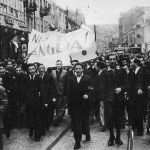 launch a significant land offensive…even though the terms of the Anglo-Polish and Franco-Polish military alliances obligated the United Kingdom and France to assist Poland. They simply stood by and let it happen.
launch a significant land offensive…even though the terms of the Anglo-Polish and Franco-Polish military alliances obligated the United Kingdom and France to assist Poland. They simply stood by and let it happen.
The quiet of the so-named Phoney War was marked by a few Allied actions. During the Saar Offensive in September, France attacked Germany with the intention of assisting Poland, but the attack fizzled out within days and the French withdrew. In November, the Soviets attacked Finland in the Winter War. This resulted in much debate in France and Britain about helping Finland, but this campaign was delayed until the Winter War ended in March. The Allied discussions about a Scandinavian campaign caused concern in Germany and resulted in the German invasion of Denmark and Norway in April. Then the Allied troops that were previously assembled for Finland were redirected to Norway instead. Fighting there continued until June when the Allies evacuated, ceding Norway to Germany in response to the German invasion of France, which had taken place on May 10, 1940.
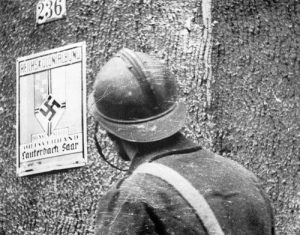
The Germans launched attacks at sea during the autumn and winter of 1939, against British aircraft carriers and destroyers, sinking several including the carrier HMS Courageous with the loss of 519 lives. Action in the air began on October 16, 1939 when the Luftwaffe launched air raids on British warships. There were various minor bombing raids and reconnaissance flights on both sides, but nothing that could possibly be viewed as a clear offensive….and during that whole time, people were dying and being subjected to various atrocities, because no one would help. Yes, war was declared, but it was a phony war, and apparently a phony declaration.

 My sister, Alena Stevens, is the refocus room coordinator and an educational support staff member at Verda James Elementary School here in Casper, Wyoming. The resource room is really where children are sent when they have a learning disability or in some way need a little bit of extra one-on-one time with an instructor. The student getting this type of support will receive some time in the resource room, which is referred to as a “removal from the regular education environment” portion of the day and some time in the regular classroom with modifications and/or accommodations which may include specialized instruction with their non-impaired peers. It isn’t a punishment, but rather a way to enhance their education, by allowing them to relax, outside of the view of their peers who do not struggle, and get the assistance they need to succeed. Besides helping children who have a special need, Alena is the playground supervisor, so she get to spend time with all the children in the school…and they all totally love her and want to stay friends with her all of their lives.
My sister, Alena Stevens, is the refocus room coordinator and an educational support staff member at Verda James Elementary School here in Casper, Wyoming. The resource room is really where children are sent when they have a learning disability or in some way need a little bit of extra one-on-one time with an instructor. The student getting this type of support will receive some time in the resource room, which is referred to as a “removal from the regular education environment” portion of the day and some time in the regular classroom with modifications and/or accommodations which may include specialized instruction with their non-impaired peers. It isn’t a punishment, but rather a way to enhance their education, by allowing them to relax, outside of the view of their peers who do not struggle, and get the assistance they need to succeed. Besides helping children who have a special need, Alena is the playground supervisor, so she get to spend time with all the children in the school…and they all totally love her and want to stay friends with her all of their lives.
It seems odd to me that I would have any specific knowledge of the on goings of the elementary schools, because my children are grown and so are my grandchildren, so how would I really know what is going on in the elementary schools? Well, in most cases, I wouldn’t, but because I have become friends over the years with some of the students who came in contact with my sister, and because our grand nephew, Ethan Hadlock and our grand niece Aurora Hadlock, go to the school too, I have seen what a wonderful, positive impact Alena has had on their lives. These kids remain friends with her, years after they leave elementary school, and the ones I know have become such wonderful people, and many of them say that Alena had a big part in that, because as we all know, when kids struggle in school, self esteem suffers, but with the help of wonderful people like Alena, there are a bunch of kids coming out of that struggle on the winning side of life, against all odds.

 Not everyone has the ability to look back on their life and see the positive impact they had on the lives of others. Many people even wonder if anyone will remember them very long after they are gone, but when an elementary student remembers a teacher when they are married and have children of their own, you know that teacher was a very special person. That is what I hear about my sister, Alena Stevens, and it makes me proud. Today is Alena’s birthday. Happy birthday Alena!! Have a great day!! We love you!!
Not everyone has the ability to look back on their life and see the positive impact they had on the lives of others. Many people even wonder if anyone will remember them very long after they are gone, but when an elementary student remembers a teacher when they are married and have children of their own, you know that teacher was a very special person. That is what I hear about my sister, Alena Stevens, and it makes me proud. Today is Alena’s birthday. Happy birthday Alena!! Have a great day!! We love you!!

